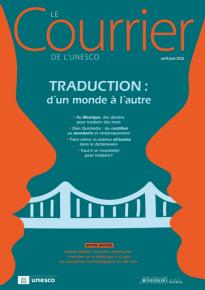فكرة
أوليفات أوتال: "تاريخ الأشخاص السّود في أوروبا مُصاب بفقدان جزئي للذّاكرة"

إنّ وجود أشخاص مُنحدرين من أصل إفريقي في أوروبا غالبا ما يُتناول من منظور العبودية والاستعمار، فيحجب بذلك تاريخا مشتركا أقدم بكثير.
أجرت المقابلة أنياس باردون
اليونسكو
يحمل كتابكِ عنوان " الأفارقة الأوروبيون، تاريخٌ غير مروي" والحال أنّه لم تَجر العادة على تسمية الأشخاص المُنحدرين من إفريقيا، والذين يعيشون في أوروبا، بالأفارقة الأوروبيين. فلماذا اخترتِ هذه العبارة؟
عبارة "إفريقي أوروبي" أو "أفرو-أوروبي" هي فعلا عبارة قليلة الاستعمال في أوروبا، في حين أن ما يعادلها – أفريقي-أمريكي - شائع في الضفّة الأخرى من المحيط الأطلسي. لقد استعملتُها بشيء من الاستفزاز، ولكن أيضًا وقبل كلّ شيء، لأُبيّن أن الأشخاص المنحدرين من الهجرة الإفريقية لديهم هويّة متعدّدة.
فالأفرو-أمريكيون تبنّوا هذا التّعبير وامتلكوه، لكن الأفرو-أوروبيين بقوا أكثر تردّدًا في المطالبة به بسبب السّياق التاريخي، لأنّه في أوروبا، هناك توجّه في نَسْبِهِم إلى أصولهم الإفريقية حتى إن كانوا مولودين على أرض أوروبية ويحملون جنسيّة البلد الذي نشأوا فيه. ومع ذلك، أعتقد أن لهذه التّسمية ميزة الإفصاح عن أصول الأشخاص من أصل أفريقي وعن تنوّع خبراتهم وبيئاتهم.
يُعتقد، عموما، أنّ تاريخ الأشخاص السّود في أوروبا يبدأ مع القرنين السابع عشر والثامن عشر. ولكنّك بيّنتِ أنّ وجودهم سابقٌ بكثير لذلك التّاريخ.
عندما نتعرّض إلى هجرة الأشخاص القادمين من إفريقيا إلى أوروبا، نميل عادة إلى الاعتقاد بأنها تعود إلى عهد تجارة العبيد. لكنّها في الحقيقة، أقدم بكثير. فمنذ العصور القديمة، سُجّل وجود أشخاص في الإمبراطورية الرومانية قادمين من القارّة الأفريقية. وفي غياب الإحصائيات، يصعب اليوم تقدير عددهم. لكن ما نعرفه هو أن عددا منهم أصبحوا شخصيات مرموقة، مثل الإمبراطور سيبتيموس سيفيروس، المولود فيما يُعرف الآن بليبيا، أو عدد من المفكّرين من أمثال القدّيس أوغسطينوس أو أبوليوس، القادمَيْن من شمال إفريقيا.
ولقد استمرّ هذا الحضور على مرّ القرون. ففريدريك الثاني، ملك صقليّة (وإمبراطور الإمبراطورية الرّومانية الجرمانية المقدّسة منذ سنة 1220) قد استقبل أفارقة في بلاطه ووظّف بعضهم في خدمته، حتى أنّه جعل من أحدهم، جان "الموريسكي"، حاجبه الشّخصي. وإلى غاية نهاية القرن الخامس عشر، حكم المسلمون العرب من شمال أفريقيا الجزء الأكبر من شبه الجزيرة الأيبيرية. ومنذ منتصف القرن الخامس عشر، بدأت العائلات الثريّة، من وسط إيطاليا وشمالها، في توظيف خدمٍ قادمين من إفريقيا. وتشهد على ذلك العديد من لوحات عصر النّهضة.
هناك إذن تاريخ مشترك بين إفريقيا وأوروبا أقدم بكثير وأكثر ثراءً مما نتخيّل. إلّا أن جزءًا من هذا التّاريخ لم يُعتبر جديرا بأن يُدرّس في المؤسّسات التّربوية. لقد تعوّدنا على مقاربة التّاريخ من خلال عدسة تجارة العبيد التي سادت، نوعا ما، كفترة تاريخية وحجبت ما سبقها. هكذا، أصيب، إذن، التاريخ السّابق بفقدان جزئي للذّاكرة.
كيف تطوّرت على مرّ القرون النّظرة إلى الأشخاص الذين قدِموا من أفريقيا في أوروبا؟
كانت الأحكام المسبقة ضدّ الأفارقة، في علاقة باللّون، موجودة دون شكّ قبل القرن السّابع عشر، إلا أن الفجوة بين المسيحيين والمسلمين كانت، بين العصور الوسطى وعصر النّهضة، طاغية على معظم الاعتبارات الأخرى. وعلى صعيد آخر، كانت هذه الأحكام المُسبقة تُمارَس بشراسة ضد مجموعات أخرى من ذوي البشرة البيضاء مثل الأيرلنديين، الذين يعتبرهم الإنجليز متوّحشين.
نقطة التحوّل الحقيقية تمثّلت في تطوّر تجارة العبيد، عندما انخرط البرتغاليون، والفرنسيون، والإنجليز، والهولنديون، والإسبان، والسويديّون، وتجّار البندقية، في هذا السّباق المحموم من أجل الرّبح. عندها، طوّر الأوروبيون نظريّات حول الدّونِيّة العرقيّة للأفارقة لتبرير تجارة العبيد. وهو ما أدّى إلى تغيير النّظرة إلى الأفارقة بشكل دائم بعد سنة 1700.
ظهرت نظريّاتٌ حول الدّونِيّة العرقيّة لتبرير تجارة العبيد
تلك هي الفترة التي تمّ فيها تجريد السّود من إنسانيّتهم واعتبارهم سِلعًا. وهذا مُوثّق تماما من وجهة النّظر التاريخية. ولدينا العديد من دفاتر الوقائع والسّجلاّت ودفاتر الحسابات التي تشهد على ذلك. ومنذ ذلك الحين، أصبح يُنظر إلى الهويّات الأوروبيّة على أنّها الأفضل بسبب قوّتها الاقتصادية. وفي الواقع، بقدر ما غيّرت تجارة العبيد النّظرة، كيّفت أيضًا الهويات ورسّبتها بتعميق الفصل بين البيض والسّود.
هل يعمل المؤرّخون اليوم على تحيين فصول لم يتم استكشافها إلى حدّ الآن، جزئيا أو كليّا، في علاقة بتاريخ الأشخاص الذين قدِموا من إفريقيا إلى أوروبا؟
نعم، وأنا جدّ متفائلة بخصوص هذا الموضوع. فمجرّد توصّلي إلى نشر كتابي وحصوله على كل هذا الصّدى هو، في حدّ ذاته، مؤشّر على ذلك. إنّها فترة مثيرة للغاية عندما تكون مؤرِّخًا لأنك تشعر أنّ الخطوط تتحرّك، وأن هناك تفكير بصدد الإنجاز في اتّجاه تسليط نظرة مغايرة على هذا الجانب من التّاريخ. هذا، وقد بدأ هذا التّفكير يجد ترجمته في مجال التّعليم.
فحاليًا، في المملكة المتحدة، نحن بصدد القيام بمحاولة بإدراج ما نسمّيه "تاريخ السّود" في البرنامج الدّراسي. وهو، حاليا، ليس سوى مادّة اختيارية. أما في بلاد الغال، حيث أُقيم، فقد قرَّرت، بعدُ، حكومة المجلس الغالي إدراج هذا التاريخ ضمن البرامج الدّراسية. إنّها خطوة مهمّة. وفي فرنسا، ومنذ قانون توبيرا الذي أدخل تدريس تجارة العبيد في برامج المدارس الابتدائية سنة 2002، تم بالفعل تدريس جزءٍ من هذا التّاريخ. فالوضع يختلف كثيرا من بلد إلى آخر، وما زال هناك عمل كبير يتعيّن القيام به، لكن الوضع يتطوّر بشكل إيجابي. في هذه المرحلة، أعتقد أنّه من المفيد تزويد المعلّمين ببعض الأدوات لجعلهم يشعرون بالرّاحة عند تدريس تلك الفصول من تاريخنا، والتي لا تقتصر على تاريخ العبوديّة وإلغائها أو على تاريخ الهجرات، بل تشكّل مجال دراسة أوسع بكثير.
كيف تطوّرت خلال السنوات الأخيرة المقاربات التي تعتمد الذاكرة بخصوص تجارة العبيد في أوروبا؟
ما زالت ذكرى العبوديّة تصطدم بمقاومات شديدة حيث نشاهد تأرجحا بين تطرّفين من قِبل الدّول. فإمّا الإمعان في عقلية الضحيّة وإمّا فقدان الذّاكرة. وتعود أسباب مقاومة الدّول إلى أن هذه الذّاكرة تدعو إلى إعادة النّظر في سرديّتها الوطنية. وحتى إن احتفلت بشخصيّات منحدرة من القارة الأفريقية وسبق لها أن أثّرت في التّاريخ، فلا يعني ذلك اعترافا بالدّور الذي يلعبه الأفرو-أوروبيون حاليّا، في الحياة اليوميّة. لذا، فأنا غير مرتاحة للمقاربة التي تعتمد تقديس البعض على حساب الآخرين، مع إقراري بأن ذلك أفضل، دون شكّ، من الفقدان التامّ للذّاكرة. من ناحية أخرى، عندما نحتفل بإلغاء العبودية، فإنّنا، نطمس، عمومًا الجانب التاريخي المتعلّق بالمقاومة التي أبداها السّود، والحال أن تلك المقاومة حدثت في جنوب أوروبا، خاصة، حيث شكّلت الجمعيات الدّينية للعبيد، التي تأسّست في البداية لمناقشة المسائل الدينية، اعتبارًا من القرن الخامس عشر أماكن لتبادل الآراء ومكافحة الاستعباد المسلّط على السّود من أسيادهم البيض، كما حصل مع الجمعية الدينية نوسا سنهورا دو هومنز بريتوس Nossa Senhora do Rosario dos Homens Pretos (سيدة الوردية للأشخاص السود) التي تأسّست في لشبونة سنة 1470. كما أنّنا غالبا ما ننسى دور الأشخاص الذين ناضلوا إلى جانب دعاة إلغاء العبوديّة. وبالتاّلي، فإنّ الواقع التاّريخي أكثر تعقيدًا من الواقع الذي يتم تقديمه عموما.
ما هي الصّلة بين هذا التّاريخ والعنف المُسلّط من قبل الشّرطة، خاصّة، ضدّ السّود؟
تعود جذور التّمييز والعنف البوليسي إلى التّاريخ الاستعماري. فالطّريقة التي تمّ التّعامل بها مع الأجساد السّوداء لها علاقة بهذا التاريخ. وقد وُلدت حركة "بلاك لايفز ماتر" (حياة السّود مهمّة) من الغضب ومن الألم أيضًا والشعور بالعجز تّجاه هذا التّمييز. ولئن وجدت صدًى لها في أوروبا فلأنّ هذا العنف البوليسي ليس سوى رجعُ صدى للتمييز المُسلّط على السكّان السود.
في هذا الصّدد، ألاحظ أن جيل أبنائي له مقاربة مختلفة تمامًا عن مقاربة الأجيال السّابقة. فهو جيل لا يخشى تحدّي النظام أو معارضة السّلطة القائمة.
تعود جذور التّمييز والعنف البوليسي إلى التّاريخ الاستعماري
عندما كنت طالبة، كنّا نعتقد أن العمل الجادّ لتحقيق النّجاح سيكون كافيًا لإخماد أصوات العنصريّين. لكن اتّضح أنّ ذلك لا يكفي. فشبّان اليوم لم يعودوا يتردّدون في التّنديد بصوت عالٍ بالعنصرية والتّمييز الّذين يتعرضون لهما. كما أنّهم يتمتّعون بأكثر حريّة ويجدون راحة أكبر في انتمائهم إلى هويّات متعدّدة، تلك المتحصّلين عليها من آبائهم، ومن وسطهم الأصلي، ومن المجتمع الذي نشأوا فيه.
أوليفات أوتال
أوليفات أوتال، مؤلّفة "أفارقة أوروبيون، تاريخ غير مروي" African Europeans, An Untold History، تشغل خطّة أستاذة التاريخ الاستعماري في جامعة بريستول بالمملكة المتحدة. وهي من أصل كاميروني، وأوّل امرأة سوداء تشغل كرسيًّا للتّاريخ في المملكة المتّحدة.
مطالعات ذات صلة
العنصرية: مواجهة اللاّمفكّر فيه من قضايانا، رسالة اليونسكو، أكتوبر - ديسمبر2020
تجارة العبيد: رحلة ثقافية غريبة، رسالة اليونسكو، ديسمبر 2004
الرّسالة ضدّ العنصرية، مختارات من أعداد ومقالات مخصصة لهذا الموضوع
اشترك في رسالة اليونسكو لمتابعة الأحداث. الاشتراك في النسخة الرقمية مجاني %100.
Interview by Agnès Bardon
UNESCO
The title of your book is African Europeans: An Untold History. It is unusual to refer to people of African descent living in Europe as African Europeans. Why did you choose to use this term?
The term ‘African European’ or ‘Afro-European’ is not widely used in Europe, whereas its equivalent – African American or Afro-American – is common across the Atlantic. I used it somewhat provocatively but also, and more importantly, to highlight the fact that people of African descent have a plural identity.
African Americans have appropriated the term, but African Europeans are more reluctant to use it because of the historical context; as in Europe they are often referred back to their African origin – even if they were born on European soil, and hold the nationality of the country in which they grew up. However, I think this designation has the merit of reflecting the diversity of origins, experiences and backgrounds of people of African origin.
The history of black people in Europe is generally considered to begin in the seventeenth and eighteenth centuries. You show that they have been there for much longer.
When we talk about the migration of people from Africa to Europe, we tend to trace it back to the slave trade. But it is much older. People from the African continent have been present in the Roman Empire since antiquity. In the absence of a census, it is difficult to assess their numbers today. But what we do know is that some of them became illustrious figures – such as the emperor Septimius Severus [145-211], who was born in what is now Libya, or some thinkers, such as Saint Augustine [354-430], or Apuleius [124-170], who came from North Africa.
This presence continued over the centuries. Frederick II, king of Sicily and Holy Roman emperor from 1220 to 1250, welcomed Africans into his court and employed them in his service. He even made one of them, John “the Moor”, his chamberlain. Until the end of the fifteenth century, Arab and North African Muslims ruled over most of the Iberian Peninsula. And from the mid-fifteenth century onwards, wealthy families in central and northern Italy began to employ servants from Africa. Many Renaissance paintings bear witness to this.
So there is a shared history between Africa and Europe, much older and richer than one might imagine. But part of this history has not been considered relevant enough to be taught in schools. We have become accustomed to viewing history through the prism of the slave trade. This historical moment has somehow eclipsed, or masked, what came before. As a result, this history has been struck by a partial amnesia.
How has the perception of people from Africa changed over the centuries in Europe?
Before the seventeenth century, colour prejudice against Africans did exist, of course. But from the Middle Ages and into the Renaissance, the divide between Christians and Muslims outweighed most other considerations. Moreover, this prejudice was also directed virulently against other white-skinned groups, such as the Irish, who were perceived as savages by the English.
The real turning point was the development of the slave trade, when the Portuguese, French, English, Dutch, Spanish, Swedes, and Venetians became embroiled in this frenzied race for profit. Theories about the racial inferiority of Africans were then developed by Europeans to justify the slave trade.
Theories about racial inferiority were developed to justify the slave trade
This had a lasting effect on the perception of Africans after 1700. It was at this time that black people were dehumanized and regarded as commodities. This is well-documented from a historical point of view. We have numerous log-books, registers and account books that attest to this.
From that moment on, European identities were perceived as superior because of their economic power. Indeed, the slave trade changed people’s perceptions, but it also shaped and sedimented identities, by accentuating the separation between whites on one side and blacks on the other.
Is the work of historians bringing to light chapters in the history of people from Africa in Europe that have been little explored or overlooked until now?
Yes, I am very optimistic about this. Just the fact that I have been able to publish a book like mine, and that it has had such a response is significant. It is a very exciting time to be a historian, because you can sense that the lines are shifting – that a reflection is taking place that is leading to a different view of this aspect of history. And this reflection is also beginning to be translated into teaching.
In the UK, we are currently trying to integrate what we call ‘Black History’ into the school curriculum. At the moment, it is only an optional subject. But in Wales, where I live, the Welsh Assembly has already decided to incorporate it into the curriculum. This is an important step.
In France, since the Taubira law – which introduced the teaching of the slave trade into the primary school curriculum in 2002 – part of this history is already being taught. The situation varies a lot from country to country, and there is still a lot to be done, but it is moving in the right direction.
At this stage, I think it would be useful to provide teachers with tools so that they feel comfortable teaching these chapters of our history – which are not just about the history of slavery, abolition, or migration, but cover a much broader field of study.
How have approaches to the memory of the slave trade in Europe evolved in recent years?
The memory of slavery still meets with strong resistance. We see states oscillating between two extremes: victimization on the one hand, and amnesia on the other. States resist because this memory challenges their national narrative. And even when they celebrate personalities from the African continent who have left their mark on history, they fail to recognize the role that Afro-Europeans play today in everyday life.
As a result, I am uncomfortable with an approach that canonizes some at the expense of others, though I recognize that this is obviously preferable to complete amnesia. Also, when we celebrate abolition, the historical aspect of black resistance is usually obscured.
Yet this resistance took place, particularly in southern Europe, where slave brotherhoods, initially founded to discuss religion, were, from the fifteenth century onwards, places of exchange and struggle against enslavement by their white masters. For example, the brotherhood of Nossa Senhora do Rosário dos Homens Pretos (Our Lady of the Rosary of Black People), was set up in Lisbon in 1470.
The role of those who fought alongside the abolitionists is also often forgotten. The historical reality is therefore much more complex than what is usually presented.
What is the link between this history and the violence – particularly by the police – against black people?
Discrimination and police violence have their origins in colonial history. The way black bodies are treated has to do with this history. The Black Lives Matter movement was born out of anger but also out of pain, out of a feeling of powerlessness in the face of this discrimination. It has found an echo in Europe simply because this police violence echoes the discrimination suffered by black people.
Police violence has its origins in colonial history
In this respect, I notice that my children's generation has a very different approach to that of previous generations. It is also a generation that is not afraid to defy the system or challenge the established order.
When I was a student, people thought that working hard to succeed would be enough to silence the racists. But it turns out that this is not enough.
Young people today no longer hesitate to speak out loud against the racism and discrimination they are subjected to. They are also freer and more comfortable with the fact that they have several identities – that of their parents, their origins, and of the society in which they are growing up.
Olivette Otele
The author of African Europeans: An Untold History, Olivette Otele is a Professor of History of Slavery and memory of Enslavement at the University of Bristol in the United Kingdom. Born in Cameroon and raised in Paris, she is the first black woman to be a History professor in the UK.

More from Our Guests








